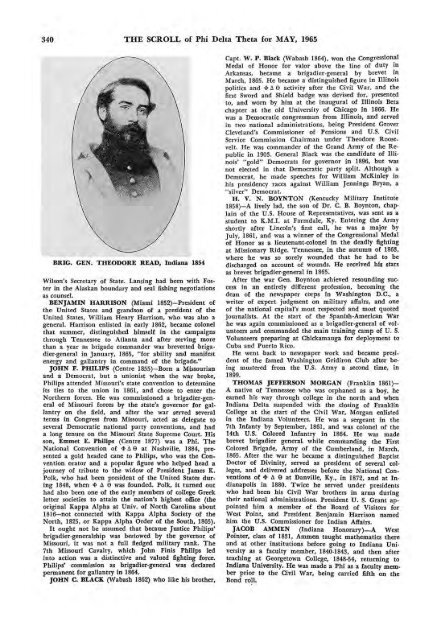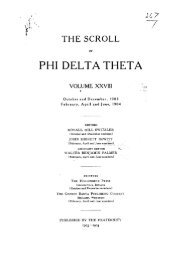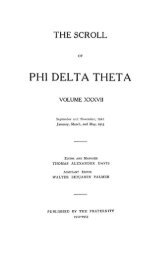1964–65 Volume 89 No 1–5 - Phi Delta Theta Scroll Archive
1964–65 Volume 89 No 1–5 - Phi Delta Theta Scroll Archive
1964–65 Volume 89 No 1–5 - Phi Delta Theta Scroll Archive
- No tags were found...
Create successful ePaper yourself
Turn your PDF publications into a flip-book with our unique Google optimized e-Paper software.
340 THE SCROLL of <strong>Phi</strong> <strong>Delta</strong> <strong>Theta</strong> for MAY, 1965BRIG. GEN. THEODORE READ, Indiana 1854Wilson's Secretary of State. Lansing had been with Fosterin the Alaskan boundary and seal fishing negotiationsas counsel.BENJAMIN HARRISON (Miami 1852)-President ofthe United States and grandson of a president of theUnited States, William Henry Harrison, who was also ageneral. Harrison enlisted in early 1862, became colonelthat summer, distinguished himself in the campaignsthrough Tennessee to Atlanta and after serving morethan a year as brigade commander was brevetted brigadier-generalin January, 1865, "tor ability and manifestenergy and gallantry in command of the brigade."JOHN F. PHILIPS (Centre 1855)-Born a Missourianand a Democrat, but a unionist when the war broke.<strong>Phi</strong>lips attended Missouri's state convention to determineits ties to the union in 1861, and chose to enter the<strong>No</strong>rthern forces. He was commissioned a brigadier-generalof Missouri forces by the state's governor for gallantryon the field, and after the war served severalterms in Congress from Missouri, acted as delegate toseveral Democratic national party conventions, and hada long tenure on the Missouri State Supreme Court. Hisson, Emmet E. <strong>Phi</strong>lips (Centre 1877) was a <strong>Phi</strong>. TheNational Convention of •* A 6 at Nashville, 1884, presenteda gold headed cane to <strong>Phi</strong>lips, who was the Conventionorator and a popular figure who helped head ajourney of tribute to the widow of President James K.Polk, who had been president of the United States during1848, when * A 0 was founded. Polk, it turned outhad also been one ot the early members of college Greekletter societies to attain the nation's highest office (theoriginal Kappa Alpha at Univ. of <strong>No</strong>rth Carolina about1816^not connected with Kappa Alpha Society of the<strong>No</strong>rth, 1825, or Kappa Alpha Order of the South, 1865).It ought not be assumed that because Justice <strong>Phi</strong>lips'brigadier-generalship was bestowed by the governor ofMissouri, it was not a full fledged military rank. The7th Missouri Cavalry, which John Finis <strong>Phi</strong>lips ledinto action was a distinctive and valued fighting force.<strong>Phi</strong>lips' commission as brigadier-general was declaredpermanent for gallantry in 1864.JOHN C. BLACK (Wabash 1862) who like his brother.Capt. W. P. Black (Wabash 1864), won the CongressionalMedal of Honor for valor above the line of duty inArkansas, became a brigadier-general by brevet inMarch, 1865. He became a distinguished figure in Illinoispolitics and * A 9 activity after the Civil War, and thefirst Sword and Shield badge was devised for, presentedto, and worn by him at the inaugural of Illinois Betachapter at the old University ot Chicago in 1866. Hewas a Democratic congressman from Illinois, and servedin two national administrations, being President GroverCleveland's Commissioner of Pensions and U.S. CivilService Commission Chairman under Theodore Roosevelt.He was commander of the Grand Army ot the Republicin 1903. General Black was the candidate ot Illinois'"gold" Democrats tor governor in 1<strong>89</strong>6, but wasnot elected in that Democratic party split. Although aDemocrat, he made speeches tor William McKinley inhis presidency races against William Jennings Bryan, a"silver" Democrat.H. V. N. BOYNTON (Kentucky Military Institute1858)—A lively lad, the son of Dr. C. B. Boynton, chaplainot the U.S. House ot Representatives, was sent as astudent to K.M.I, at Farmdale, Ky. Entering the Armyshortly after Lincoln's first call, he was a major byJuly, 1861, and Was a winner ot the Congressional Medalof Honor as a lieutenant-colonel in the deadly fightingat Missionary Ridge. Tennessee, in the autumn ot 1863,where he was so sorely wounded that he had to bedischarged on account of wounds. He received his starsas brevet brigadier-general in 18651After the war Gen. Boynton achieved resounding successin an entirely different profession, becoming thedean ot the newspaper corps in Washingtoii D.C, awriter ot expert judgment on military affairs, and oneof the national capital's most respected and most quotedjournalists. At the start ot the Spanish-American Warhe was again commissioned as a brigadier-general of volunteersand commanded the main training camp of U. S.Volunteers preparing at Chiekamauga for deployment toCuba and Puerto Rico.He went back to newspaper work and became presidentof the famed Washington Gridiron Club after beingmustered from the U.S. Army a second time, in1<strong>89</strong>9.THOMAS JEFFERSON MORGAN (Franklin 1861)-A native of "Tennessee who was orphaned as a boy, heearned his way through college in the north and whenIndiana <strong>Delta</strong> suspended with the closing of FranklinCollege at the start of the Civil War, Morgan enlistedin the Indiana Volunteers. He was a sergeant in the7th Intanty by September, 1861, and was colonel of the14th U.S. Colored Infantry in 1864. He was madebrevet brigadier general while comiSianding the FirstColored Brigade, Army ot the Cumberland, in March,1865. After the war he became a distinguished BaptistDoctor of Divinity, served as president of several colleges,and delivered addresses before the National Conventionsof 4> A 9 at Danville, Ky., in 1872, and at Indianapolisin 1880. Twice he served under presidentswho had been his Civil War brothers in arms duringtheir national administrations. President U. S. Grant appointedhim a member of the Board of Visitors forWest Point, and President Benjamin Harrison namedhim the U.S. Commissioner for Indian Affairs.JACOB AMMEN (Indiana Honorary )^A WestPointer, class of 1831, Ammen taught mathematics thereand at other institutions before going to Indiana Universityas a faculty member, 1840-1843, and then afterteaching at Georgetown College, 1848-54, returning toIndiana University. He was made a <strong>Phi</strong> as a faculty rhemberprior to the Civil War, being carried fifth on theBond roll.
















